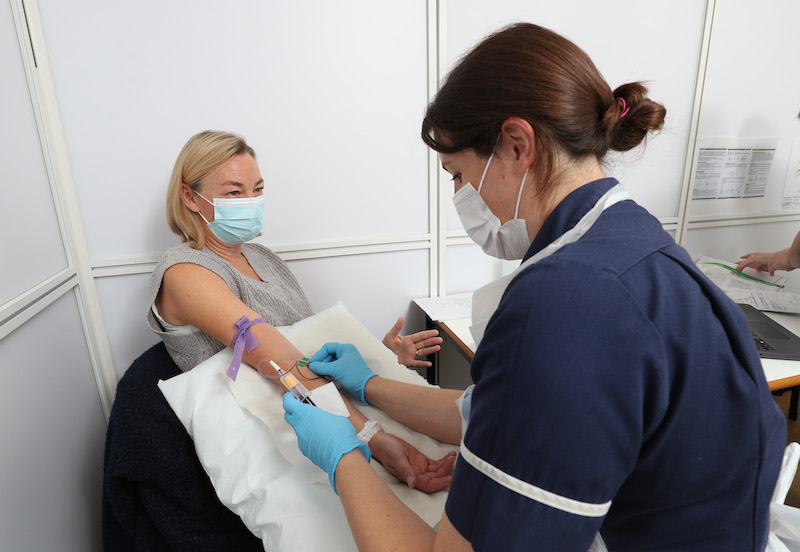World-first study supported by volunteers from North Wales publishes COVID-19 booster data

Six COVID-19 vaccines are safe and boost immunity for people who have had two doses of AstraZeneca or Pfizer-BioNTech, results from the UK-wide COV-BOOST trial show.
The world-first study, for which Public Health Wales recruited volunteers at the North Wales Clinical Research Facility based at Wrexham Maelor Hospital, was key to shaping the UK booster programme and gives vital evidence for global vaccination efforts. The study has had its latest results published in the Lancet.
COV-BOOST looked at the safety, immune responses and side-effects of seven vaccines when used as a third, booster jab. 164 volunteers joined the study from across the Wrexham area.
Run at 18 sites across the UK, the study saw 2,878 people aged 30 or over recruited overall. Participants received one of these boosters 10-12 weeks after their initial two-dose vaccination with either AstraZeneca or Pfizer-BioNTech. A control group was given a meningitis vaccine, to account for reactions not specific to the COVID-19 jabs
The seven vaccines trialled were:
- AstraZeneca-Oxford
- Pfizer-BioNTech
- Moderna
- Novavax
- Valneva
- Janssen
- CureVac
Of these, only AstraZeneca, Pfizer-BioNTech, Moderna and Janssen are currently licensed for use in the UK. Half-doses of Pfizer-BioNtech, Novavax and Valneva were also tested.
Professor Saul Faust, trial lead and Director of the NIHR Clinical Research Facility, University Hospital Southampton NHS Foundation Trust (UHS), said: “Our side effect data shows all seven vaccines are safe to use as a third dose, with acceptable levels of ‘reactogenicity’ – inflammatory side effects like injection site pain, muscle soreness, fatigue.
“All seven boosted levels of spike protein antibodies significantly after two doses of AstraZeneca. However only six also did so after two doses of Pfizer-BioNTech (AstraZeneca, Pfizer-BioNTech, Moderna, Novavax, Janssen and CureVac). There were also large variations in response with different boosters.
“It’s really encouraging that a wide range of vaccines, using different technologies, show benefits as a booster dose to either of these vaccines. That gives confidence and flexibility in developing booster programmes here and globally, with other factors like supply chain and logistics also in play.”
There were large differences in spike protein antibody levels after 28 days across the vaccines. In people who had received two initial doses of AstraZeneca, these ranged from 1.8 times higher to 32.3 times higher with different booster vaccines. For those who had received Pfizer-BioNTech initially, the range was 1.3 times higher to 11.5 times higher. Booster results were similar for those aged 30-69 years and those aged 70 years or older.
The study also looked at immune T-cell responses. T-cells are likely to be important in controlling disease severity, although their impact on overall protection or longevity of immunity is not yet known. COV-BOOST reported T-cell responses in several combinations of initial and booster vaccines, however these were not predictable based on spike protein antibody levels.
Reactions to all seven vaccines were similar, with fatigue, headache, and injection site pain most often reported. These were more commonly reported by those aged 30-69. 912 of the 2,878 participants experienced a total of 1036 adverse events, only 24 of which were severe.
Prof Faust added: “It’s important to note two things about these results. First, they only relate to these vaccines as boosters to the two primary vaccinations, not how well they work as first and second doses. Secondly, the data describes the immune response at 28 days, not vaccine effectiveness.
“The relationship between that response and long-term protection is still poorly understood. We will be looking at the longer-term immune responses in COV-BOOST, conducting further tests at three months and one year after receiving boosters.
“We are also looking at whether a longer period between second and third doses improves response to the two of the booster vaccines. Several studies have shown this effect between first and second doses. We’ve done that by giving some of our original control participants the booster at a later point, and we expect those results to be available in the new year.”
Dr Orod Osanlou, Consultant Physician and Principal Investigator for Public Health Wales and the COV-BOOST study said: “We are proud that the North Wales Clinical Research Facility has supported such an important, world-first study. This will inform the future rollout of the COVID-19 vaccination programme across Wales and internationally.
“I would like to thank all of our study participants and staff across Betsi Cadwaladr University Health Board who made this research possible, contributing to the UK-wide effort to tackle the pandemic.”
Professor Andrew Ustianowski, National Clinical Lead for the UK NIHR COVID Vaccine Research Programme said: “Heading into the winter, and due to the emergence of the Omicron, the results from the COV- BOOST study are extremely timely and of national and international importance.
“Since the beginning of the pandemic the National Institute for Health Research and the NHS have been supported by the efforts and selflessness of study participants – helping us to identify the most effective vaccines and how they can be used flexibly to protect more people.
“We welcome the latest results from the study, and continue to support the COV-BOOST team with the further analysis of data which will help us understand the use of these vaccines as boosters long term.”
Spotted something? Got a story? Email: [email protected]
Latest News
